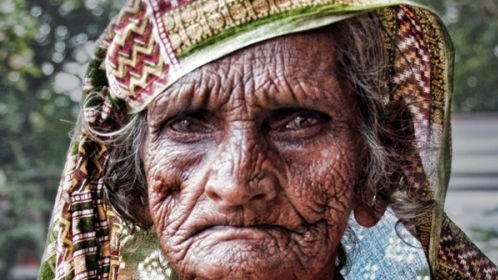COLOMBO, Sri Lanka (GPI)-- Vasanthi Weerasinghe is a single mother of three children. They live in a small, part-brick, part-plank house in Uswetakeiyawa, a suburb of Colombo, the capital of Sri Lanka. Weerasinghe earns a meager income from doing domestic work in three houses nearby. In addition to supporting her children, she also cares for her mother, Mary Margaret Perera, who lives with the family.
“I can hardly feed myself and my children,” Weerasinghe says, with tears in her eyes. “How can I get her the medicines and the good food she needs?” Making her caregiving duties more challenging, her mother is “going mad,” she says. For the last eight months, her mother has become more aggressive. Weerasinghe, who has never heard of dementia or Alzheimer’s disease, says she has had to tie her mother to a beam with a long rope in the small shed adjoining their house when she leaves for work every morning. “What else can I do?” she asks. “My mother raised me and six siblings after our father died when we were young. I am the youngest in the family, and she came to help me when my husband left me. None of my sisters or brothers will help me look after her. But I can’t abandon her.” Her neighbors helped her to build this shed, which is attached to the house. It has a mud floor, concrete beams and wooden planks. The room is dark and damp, and there is a strong stench of urine. Weerasinghe says she obtains sedatives from a nearby doctor that make her mother “sleepy and quiet” throughout the night. It is currently the evening, and Perera is docile and subdued. But tomorrow will be another day of confused aggression and desperate solutions. Weerasinghe is not alone. Many families in Sri Lanka are struggling to care for aging family members, yet they are unaware of their medical conditions and how to treat them. Doctors say that dementia is becoming an epidemic in Sri Lanka with its rapidly aging population. But there is a lack of awareness among the general population and the medical community about what the condition is, how to diagnose it and how to treat it. Other challenges for people with dementia and their families include social stigma and the cost of care. One foundation is striving to lead the way in changing this. Sri Lanka is one of the fastest-aging countries in the world, according to the World Bank. Sri Lankans over 60 years of age are predicted to make up nearly one-third of the population by 2050. The number of citizens with dementia in Sri Lanka is on the rise, says Dr. H.B. “Tami” Tamitegama, the founder and president of Lanka Alzheimer’s Foundation, a community organization that aims to improve quality of life for people with Alzheimer’s disease and related disorders and to provide support to their families. “There are no confirmed statistics, but we’re looking at about 150,000 persons with dementia in Sri Lanka,” he says. “And that number will gradually escalate, and we’ll have around half a million people by 2040-2050 with dementia – unless, of course, we find a miracle cure.” Alzheimer’s disease is one of the many forms of dementia, he says. Dementia is an umbrella term encompassing more than 100 physical disorders of the brain. Alzheimer’s disease is the most common of these disorders and is many times used to refer to them because “dementia” carries a negative connotation, he says. Tamitegama says that dementia doesn’t just affect the people who suffer from it, but also their families as well. “This means that almost every person in Sri Lanka will be familiar with dementia because every larger family will have at least one person with dementia,” he says.















